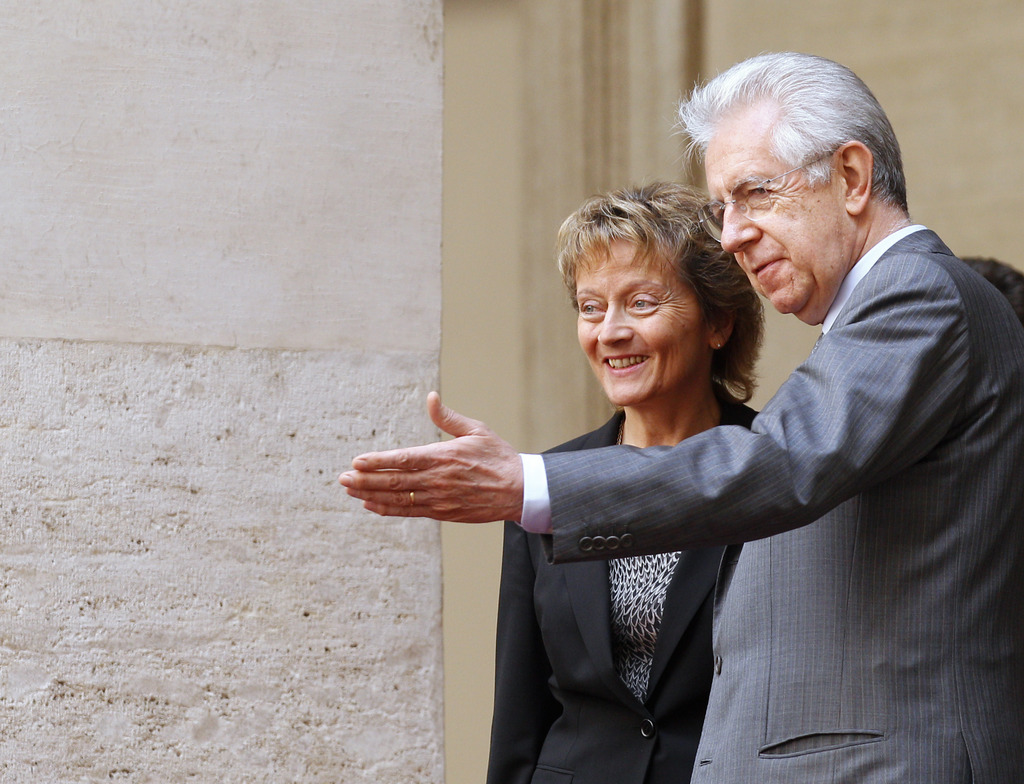Bern and Rome ‘make progress’ on tax deal

Switzerland and Italy want to conclude a bilateral tax deal as soon as possible. On Tuesday the heads of both nations met in Rome to discuss the details of the accord, which would help Italy to claim missing tax funds.
After meeting with Swiss President Eveline Widmer-Schlumpf, Italian Prime Minister Mario Monti said an Italian-Swiss working group was making good progress on a deal to fight tax evasion. He added that he was “very satisfied” with progress on discussions.
Italy is seeking a deal to claim a percentage of undeclared funds deposited in Switzerland by Italian residents, following similar deals with Germany and Britain that provided significant windfalls.
It is part of Monti’s efforts to fight rampant tax evasion as he struggles to help the country avoid being brought under by the debt crisis.
Swiss banking officials say Italians officially have more than SFr11 billion ($11.3 billion) deposited in Switzerland, but the actual total of concealed deposits is estimated to be much higher.
Monti didn’t commit to a date. “It’s difficult to give a precise forecast on when the negotiations will finish, but the important thing is the will to conduct the negotiations thoroughly and speedily. I believe this will unites our governments,” he said.
In a statement, the Swiss foreign ministry said Switzerland and Italy had undertaken to examine the following issues: revision of the double taxation agreement, existing black lists, the regularisation of assets held in Switzerland by non-resident taxpayers, the introduction of a withholding tax on future investment income, market access and the agreement regarding the taxation of cross-border commuters.
The two ministers also discussed the situation in the European Union and Switzerland’s European policy. According to the foreign ministry, the talks took place in an “open and constructive atmosphere”.
Widmer-Schlumpf, who is also the Swiss finance minister, said a solution would be found “in the coming months” for the blacklist problem, but admitted a global agreement wouldn’t be reached immediately, even if the two countries have said they want to achieve this as soon as possible.
Blacklists
Negotiations between Switzerland and Italy were put on hold in 2009 by Rome, which believed a tax agreement should be negotiated at EU level and that Bern should accept the automatic exchange of bank data.
Italy also included Switzerland on its blacklist of tax havens, making it harder for Swiss firms to do business in Italy.
As a result of these measures, last June the Swiss canton of Ticino froze tax-at-source revenues of cross-border workers that would normally go to Italy. Ticino imposed the freeze as a way of pressuring the Swiss government to renegotiate the existing agreement with Italy governing the taxation of cross-border workers.
“The blacklist certainly didn’t do economic relations between the two countries any favours, whether because of the stringent checks on dealings with Swiss firms or the costs connected to the legal provisions,” said Markus Wiget, a Swiss lawyer in Milan who looks after the interests of Swiss companies in Italy and Italian companies in Switzerland.
Nevertheless, Wiget told swissinfo.ch he was optimistic for the chances of an agreement, which would enable Rome to get hold of several billion francs.
“The financial returns are important for Italy at a time when Rome has to raise taxes to sort out its budget problem.”
For Switzerland, Italy is the second-largest supplier of goods and services (SFr19 billion in 2011) and the third-largest export market (SFr16 billion in 2011).
Italian investments in Switzerland, which represent about 14,000 jobs, totalled SFr5 billion at the end of 2010.
Some of the largest Italian companies active in Switzerland include Generali, Fiat, Pirelli and Bulgari.
For Italy, Switzerland is the sixth-largest export partner and the ninth-largest import partner.
Swiss investments in Italy amounted to SFr20 billion in 2010.
Swiss companies including ABB, Nestlé, Novartis, Roche, Zurich, UBS, Credit Suisse and Swisscom provide about 76,000 jobs in Italy.
Every day, about 55,000 Italian nationals cross the border to work in Switzerland.
Between March 20 and April 13, 2012, Switzerland signed double taxation treaties with Britain, Germany and Austria.
Based on this accord, which is called Rubik, Bern has agreed to regulate the previously non-declared, untaxed funds deposited by foreign nationals in Switzerland.
For Germany and Britain, the tax rate varies from 21-41% of the assets, depending on the age of the bank account and the value of the assets. For Austria it is 15-38%.
After the treaty comes into effect, Switzerland will pay an annual withholding tax of 26% of capital income in Germany, 27-48% in Britain and 25% in Austria.

In compliance with the JTI standards
More: SWI swissinfo.ch certified by the Journalism Trust Initiative




You can find an overview of ongoing debates with our journalists here. Please join us!
If you want to start a conversation about a topic raised in this article or want to report factual errors, email us at english@swissinfo.ch.